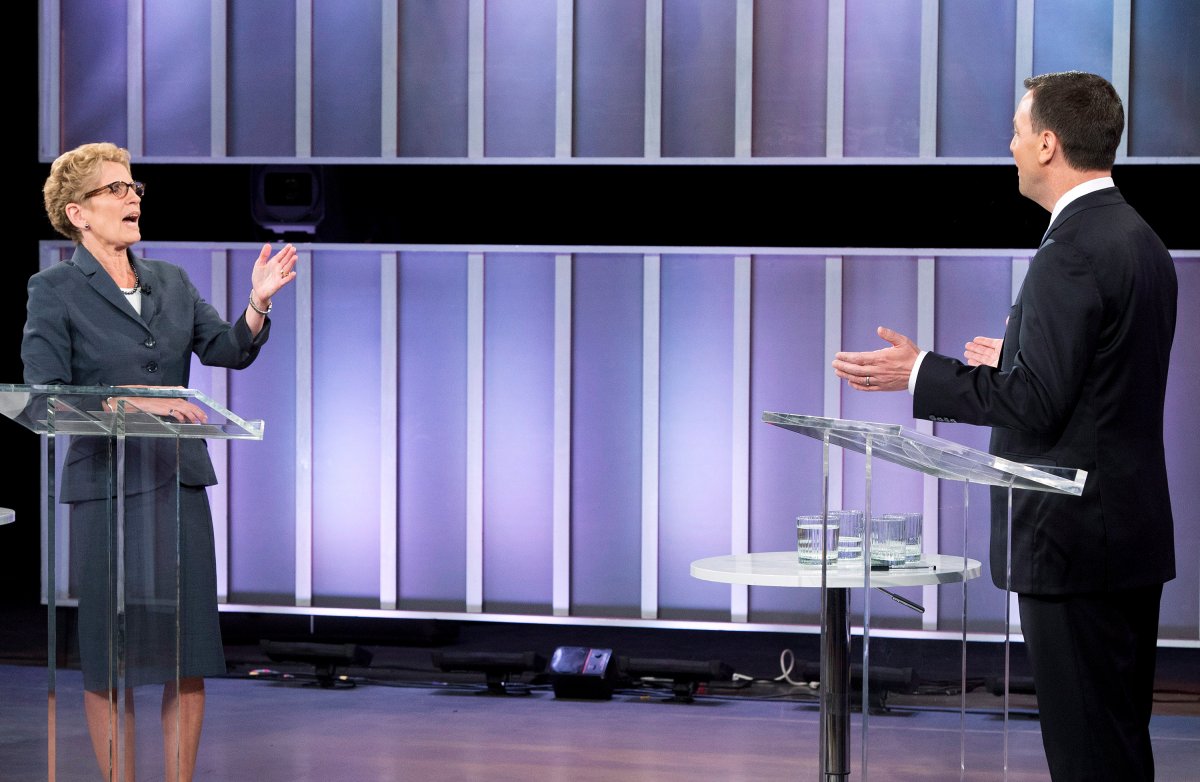The leaders of Ontario’s three main parties spent an hour and a half Tuesday evening debating gas plants, taxes, energy costs and transit.

They didn’t touch on a mammoth portion of the budget, an issue that keeps coming up when voters are asked about their priorities: health care.
The issue makes an appearance in one form or another in each party’s platform, but hasn’t been discussed much over the course of the campaign. In Tuesday’s debate, as in a previous northern debate between Kathleen Wynne and Andrea Horwath, it went unmentioned.
READ MORE: Corruption, bad math, gas plants the focus of Ontario leaders’ debate
Doris Grinspun, CEO for the Registered Nurses’ Association of Ontario, called it a “missed opportunity.”
“I know the parties have talked about health care because we study their platforms,” Grinspun said.
“It’s a missed opportunity for Ontarians that the leaders didn’t get to share their views. … To the leaders’ credit, they did drop nuggets on issues of health and health care, but no questions were asked revolving health or health care.”
READ MORE: Who won the Ontario leaders’ debate? No one
Even Health Minister Deb Matthews was taken aback at the omission.
The three parties have different hooks for each of their health care plans.

Get weekly health news
Liberal leader Wynne has promised to provide 24-7 access to primary health care by 2018 and to continue to improve access to mental health care.
NDP leader Horwath has plans to open more 24 medical facilities and employ nurse practioners to treat and discharge patients in ERs, pledging to cut wait times.
Progressive Conservative leader Tim Hudak is promising to expand home care and long term care and has said he’ll improve mental health care.
There are 700,000 Ontarians without access to primary care practitioners.
“I would have asked, ‘What is the most fundamental change you will make in the health system to ensure Ontarians have timely access to care?’ Grinspun said. “I think they should have asked, “What is the social policy to ensure that poverty doesn’t continue in Ontario and everyone has the ability to thrive?'”
Grinspun says Ontario has made big strides in health care in recent years and it’s important to continue down this road.
“We need to focus on primary care and continue to supported in the communities … whether primary care or home care,” she said. “I would encourage people to look into issues related with health and health care … At the end of the day, having a job is important, but it’s no goof if you don’t have access to timely health care.
READ MORE: Twitter reacts to the #ONdebate
Ontario Medical Association President Ved Tandan was also surprised to see health care skipped over in the debate.
“I was shocked that health didn’t come up. It’s 50 per cent of our budget and no one talked about it,” he said. ” Health care is a tough issue to talk about. There are a lot of challenges. But I don’t know why the parties aren’t willing to have that discussion.”
High on his list of priorities is better coordination of care, so patients don’t slip through the cracks of the system – between specialists and their primary care physicians, for example.
“We need government to be a partner in that,” he said. At the same time, policy-makers need to start thinking about health care not as treating sick people, but as preventing them from getting sick in the first place. That extends to education and mending the social safety net.
“I would have asked the leaders to tell us what areas in the health care system they feel they want to invest in – how are they going to invest in health care, and how are they going to partner with the health care community to understand how best to implement those changes? What I don’t want to hear from them is soundbite solutions to a very complex problem.”
WATCH: The leaders’ debate in 10 minutes




Comments